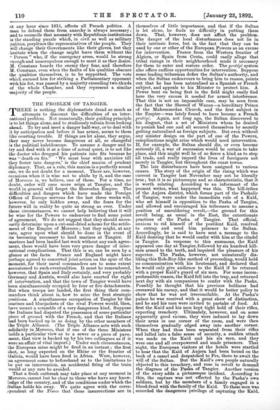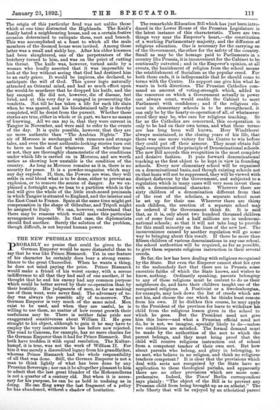THE PROBLEM OF TANGIER.
THERE is nothing the diplomatists dread so much as attempts to discount the difficulties of an inter- national problem. Not unnaturally, their guiding principle is to let things alone, and to studiously refrain from looking ahead. To try and meet a danger half-way, or to deal with it by anticipation and before it has arisen, seems to them like courting trouble. If things are let alone, they argue, they may never become dangerous at all, so changeful is the political kaleidoscope. To assume a danger and to try and deal with it at a time of actual quiet, is to act like the doctor who drugged his patients into fits because he was " death on fits." We must bear with anxieties till they fester into dangers,' is the chief maxim of prudent diplomacy. That, as a rule, this maxim is a.perfectiv sound one, we do not doubt for a moment. There are, however, occasions when it is wise not to abide by it, and the case of Morocco is, we believe, one of these. For a time, no doubt, order will once more reign at Tangier, and the world in general will forget the Shereefan Empire. The difficulties and dangers which have made the Foreign Offices of Europe nervous for the last three weeks will, however, be only hidden away, and the fears for the future will in reality be quite as strong as ever. Under these circumstances, we cannot help believing that it will be wise for the Powers to endeavour to find some point of agreement. We do not suggest that they should neces- sarily determine upon a cut-and-dried scheme for the settle- ment of the Empire of Morocco; they might, at any rate, agree upon what should be done in the event of its becoming necessary to land marines at Tangier. If marines had been landed last week without any such agree- ment, there would have been very grave danger of inter- national complications. That this is so, can be seen by a glance at the facts. France and England might have perhaps agreed to concerted joint action on the spur of the moment, for their naval commanders are to some extent accustomed to such eventualities. It must be remembered, however, that Spain and Italy certainly, and very probably Germany and Austria, would also have exerted the right of intervention, and that the town of Tangier would have been simultaneously occupied by four or five detachments. But when troops are landed, the first thing their com- manders think about is, how to seize the best strategic positions. A simultaneous occupation of Tangier by the marines and bluejackets of the rival Powers would, then, have meant a scramble of a very dangerous kind. Suppose the Italians had disputed the possession of some particular piece of ground with the French, and that the Italians had been backed up in so doing by the other members of the Triple Alliance. (The Triple Alliance acts with such solidarity in Morocco, that if one of the three Ministers holds a particular view as to a sewer or a piece of pave- ment, that view is backed up by his two colleagues as if it were an affair of vital import.) Under such circumstances, the European mine might be fired in an instant ; the first shot, so long expected on the Rhine or the frontier of Galicia, would have been fired in Africa. Were, however, an agreement come to beforehand as to the limitations to be put on intervention, an accidental firing of the train would at any rate be avoided. That a fresh outbreak may take place at any moment in Morocco, cannot but be clear to those who have any know- ledge of the country, and of the conditions under which the Sultan holds his sway. We quite agree with the corre- spondent of the Times that these insurrections are in themselves of little importance, and that if the Sultan is let alone, he finds no difficulty in putting them down. That, however, does not affect the problem. The danger of the local disturbances does not lie in their intrinsic force, but in the fact that they can be used by one or other of the European Powers as an excuse for intervention. France from the Western frontier of Algiers, or Spain from Ceuta, could easily allege that tribal risings in their neighbourhood made it necessary for them to enter and restore order. The protégé system also offers endless opportunities for intervention. Suppose some leading tribesman defies the Sultan's authority, and when the Sultan endeavours to bring him to reason, points out that he has been naturalised as a Spanish or French subject, and appeals to his Minister to protect him. A Power bent on being first in the field might easily find here the very excuse it needed for armed interference. That this is not an impossible case, may be seen from the fact that the Shereef of Wazan—a hereditary Prince of the Mahommedan Church, and the first subject in the Empire—was lately found to have become a French protege. Again, not long ago, the Sultan discovered to his disgust, that a set of Ministers whom he desired to punish had one and all secured themselves by secretly getting naturalised as foreign subjects. But even without any sinister design on the part of one of the Powers, complications might arise which would need intervention. If, for example, the Sultan should die, or even become seriously ill, a war of succession would be certain to take place, and this might well be of so fierce a kind as to stop all trade, and really imperil the lives of foreigners not merely in Tangier, but throughout the coast towns.
The late disturbances have been assigned to various causes. The story of the origin of the rising which was current in Tangier last November may not be literally true ; but it is so picturesque and so characteristic, that it is worth relating. According to an informant of the present writer, what happened was this. The hill-tribes of the Anjera district, which forms part of the Pashalic of Tangier, were under the immediate rule of a Kaid, who set himself in opposition to the Pasha of Tangier, and allowed and encouraged his tribesmen to assume a position of smouldering revolt,—the ground for this revolt being, as usual in the East, the extortionate practices of the Pasha of Tangier. That official, anxious to rid himself of the pestilent Kaid, resolved to entrap and send him prisoner to the Sultan. Accordingly, he is said to have sent a message to the Kaid desiring that he would confer with him at the citadel in Tangier. In response to this summons, the Kaid appeared one day at Tangier, followed by six hundred hill- men armed to the teeth, and inquired the pleasure of his superior. The Pasha, however, not unnaturally dis- liking this Rob-Roy-like method of proceeding, would hold no communication with his lieutenant, and declared that he would only give audience to the Kaid if he returned with a proper Kaid's guard of six men. For some incom- prehensible reason, the Kaid fell into the trap, and returned next day with six companions to confer with the Pasha. Possibly he thought that his previous boldness had overawed his enemy, and that it would be better policy to show that he was not irreconcilable. At the Pasha's palace he was received with a great show of distinction, and he and his men were invited to partake of food. At first the Kaid and his men kept tight hold of their rifles, expecting treachery. Ultimately, however, and on some apparently good excuse, they were induced to lay down their arms in one corner of the room, and were then themselves gradually edged away into another corner. When they had thus been separated from their rifles and lulled into a false sense of security, a sudden attack was made on the Kaid and his six men, and they were one and all overpowered and made prisoners. That night, the European visitors at the hotels were startled. to hear that the Kaid of Anjera had been bound on the back of a camel and despatched to Fez, there to await the will of the Sultan. But the Kaid's own people naturally objected to this treachery, and rose in revolt to demand the disgrace of the Pasha of Tangier. Another version of the story adds a picturesque incident. According to this, the capture was not effected by the Pasha's own soldiers, but by the members of a family engaged in a blood-feud with the family of the Kaid. To these men was accorded the dangerous privilege of capturing the Kaid. The origin of this particular feud was not unlike those which at one time distracted the Highlands. The Kaid's family hated a neighbouring house, and on a certain festive occasion determined to extirpate them, root and branch. This was accomplished at a feast to which all the male members of the doomed house were invited. Among these latter was a small and sickly boy. After his elder kinsmen had been slaughtered, one of the perpetrators of the butchery turned to him, and was on the point of cutting his throat. The knife was, however, turned aside by a woman who loudly asserted that it was impossible to look at the boy without seeing that God had destined him to an early grave. It would be impious, she declared, to anticipate the will of God. This queer logic naturally attracted an Oriental mind, and had so much effect upon the would-be murderer that he dropped his knife, and the boy escaped. He did not, however, die of disease, but lived, and at this very day is engaged in prosecuting the vendetta. Not till he has taken a life for each life slain when he was spared, and his bloodstained tally is thereby completed, will he desist from the pursuit. Whether these stories are true, either in whole or in part, we have no means of knowing. All we can say is, that they were current in Tangier in November, and were said to refer to the events of the day. It is quite possible, however, that they are no more authentic than " The Arabian Nights." The air of Morocco is surcharged with rumours and strange tales, and even the most authentic-looking stories turn out to have no basis of fact whatever. But whether true or not, they are thoroughly characteristic of the conditions under which life is carried on in Morocco, and are worth notice as showing how unstable is the condition of the country. As long as Morocco remains as it is, there is no security for peace. It is a powder-magazine which may any day explode. If, then, the Powers are wise, they will settle in cool blood what is to be done, either to prevent an explosion, or to remove the source of danger. As we ex- plained a fortnight ago, we lean to a partition which in the end will give the whole of the little snub-nosed peninsula in which Tangier is situated to England, and the interior and the East Coast to France. Spain at the same time might get compensation in the shape of Gibraltar, and Tripoli might be assigned to Italy. We can, however, understand that there may be reasons which would make this particular arrangement impossible. In that case, the diplomatists should find another. Surely the solution of the problem, though difficult, is not beyond human power.



































 Previous page
Previous page